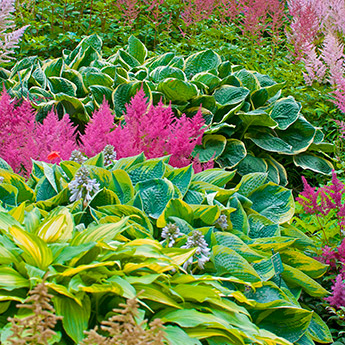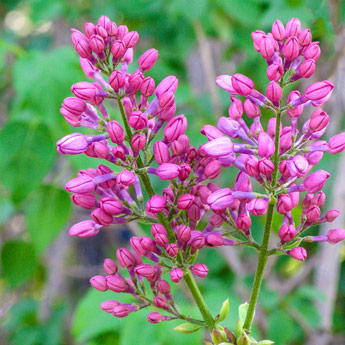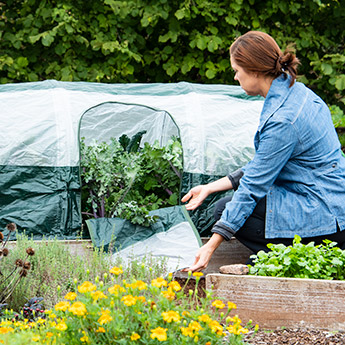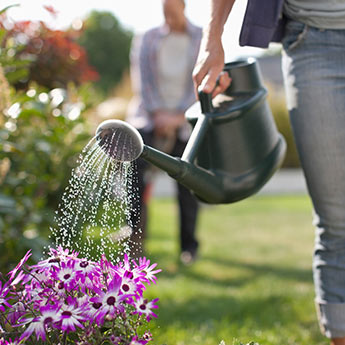When Plants Kill Plants
Q. Helen in New River Arizona writes: "I had a true "light bulb" moment when you were answering the listener from Australia who asked about composting Eucalyptus leaves. For a few years I tried growing several fruit trees near my two large Eucalyptus trees and could not figure out why they would grow for a while then just die.
"I have been gardening most of my adult life and feel I am pretty experienced, not to mention all I have learned from your show! Then I heard you say that Eucalyptus trees are allelopathic and the light bulb flashed in my brain; of course! That's what happened to my fruit trees (all 10 of them; each one costing quite a bit for good quality trees with acceptable chill hours for my location here in Arizona)!
"Now I am curious; what other plants are allelopathic and is there anything I can do about them? I live in the desert and have two huge Eucalyptus trees growing happily on the west side of my house (thanks to my loving care and enough water). They are very important to me, as the blazing hot sun can reach 118 degrees on a summer afternoon and the shade from these trees helps cool the house and keeps the cost of air conditioning down a bit.
A. Before I lurch into attempting to answer this intriguing question, I should explain the concept of "chilling hours". Most fruit trees and cane fruits like raspberries require a certain amount of cold weather to flower and produce fruit; the standard for {quote} "chilling" is below 45 degrees F. "Low chill" fruits, bred for warm areas, can generally get by with around 300 hours of such weather. I would go into more detail, but I might never come up for air. And that means its bullet point time, kats and kittens!
• Eucalyptus: Research has shown that eucalyptus trees quickly take over when introduced into an area with oak trees. Experiments using an aqueous solution of plant parts showed that 'eucalyptus water' inhibited the growth of many important crop seeds as well. Or it just plain killed them outright.
Allelopathic Influence of Eucalyptus (Eucalyptus camadulensis L.) on Germination and Seedling Growth of Crops (scialert.net)
• Black Walnut: The poster child for allelopathic plants. Every single part of the tree: leaves, fruit, bark etc., inhibits or just kills a wide range of plants. But the roots contain the most of the active ingredient juglone, and those roots typically have a spread three times the size of the canopy. As many gardeners know all too well, tomatoes (and related crops) are most severely affected.
• Garlic mustard: The headline at 'Nature dot org.' tells it all: "Invasive, destructive and edible". This common 'weed' flies under most people's radar, but it is a bad actor. Also known as 'poor man's garlic', 'hedge garlic', 'Garlic root' and 'Jack by the hedge', it has a garlicky smell when the leaves are crushed. It is a 'biennial'; a plant that takes two years to produce flowers, with small white blooms appearing the second spring. It takes down other plants in two ways. 1) it spreads it's seed earlier than native plants. It was brought here from Europe to be an erosion preventer, which turned out to be a bad idea as it prevents the growth of the later blooming plants that actually DO help prevent erosion. And 2) its root system interferes with the fungal network that helps native trees and other plants thrive. Although technically edible, you must, as with pokeweed, harvest the young shoots before they build up toxins (in this case, cyanide; what a charming plant!). Learn how to recognize it and pull it slowly out of wet ground before it flowers and sets seed. Experts say you will see the positive results of such pulling within a year as the good plants come back.
• Sunflowers: Got your attention there, didn't we? Although people LOVE feeding birds in the summer for human enjoyment, the result is a triple no no. One: Feeding seed to birds in the summer is unnecessary and potentially damaging to the birds as they lose interest in the abundant natural resources they have relied upon for centuries AND lose the food-finding instinct and the exercise it provides. Yeah, yeah--you like to watch the cute birdies...even if it leads to their extinction? Your entertainment is not worth the loss of a single species. Two: Spilled seed of any kind attracts mice, rats, voles, raccoons, rabbits, deer...and anything else you have lured to your landscape with the promise of endless food. And to the point of today's topic, #3: sunflower seed hulls are allelopathic. Or haven't you noticed that nothing grows beneath your feeder? Birds need fresh water in the summer and suet in the winter. That's it.
• The list goes on; allelopathy is an adaption that leads to a species' success. Inhibiting the growth of or just plain killing other plants is an excellent way for that plant family to survive. Always remember that the world outside our windows is Darwin, not Disney. It is a life and death struggle to survive every day, and it is not for us to change the odds by human interventions like feeding birds in the summer.
"I have been gardening most of my adult life and feel I am pretty experienced, not to mention all I have learned from your show! Then I heard you say that Eucalyptus trees are allelopathic and the light bulb flashed in my brain; of course! That's what happened to my fruit trees (all 10 of them; each one costing quite a bit for good quality trees with acceptable chill hours for my location here in Arizona)!
"Now I am curious; what other plants are allelopathic and is there anything I can do about them? I live in the desert and have two huge Eucalyptus trees growing happily on the west side of my house (thanks to my loving care and enough water). They are very important to me, as the blazing hot sun can reach 118 degrees on a summer afternoon and the shade from these trees helps cool the house and keeps the cost of air conditioning down a bit.
A. Before I lurch into attempting to answer this intriguing question, I should explain the concept of "chilling hours". Most fruit trees and cane fruits like raspberries require a certain amount of cold weather to flower and produce fruit; the standard for {quote} "chilling" is below 45 degrees F. "Low chill" fruits, bred for warm areas, can generally get by with around 300 hours of such weather. I would go into more detail, but I might never come up for air. And that means its bullet point time, kats and kittens!
• Eucalyptus: Research has shown that eucalyptus trees quickly take over when introduced into an area with oak trees. Experiments using an aqueous solution of plant parts showed that 'eucalyptus water' inhibited the growth of many important crop seeds as well. Or it just plain killed them outright.
Allelopathic Influence of Eucalyptus (Eucalyptus camadulensis L.) on Germination and Seedling Growth of Crops (scialert.net)
• Black Walnut: The poster child for allelopathic plants. Every single part of the tree: leaves, fruit, bark etc., inhibits or just kills a wide range of plants. But the roots contain the most of the active ingredient juglone, and those roots typically have a spread three times the size of the canopy. As many gardeners know all too well, tomatoes (and related crops) are most severely affected.
• Garlic mustard: The headline at 'Nature dot org.' tells it all: "Invasive, destructive and edible". This common 'weed' flies under most people's radar, but it is a bad actor. Also known as 'poor man's garlic', 'hedge garlic', 'Garlic root' and 'Jack by the hedge', it has a garlicky smell when the leaves are crushed. It is a 'biennial'; a plant that takes two years to produce flowers, with small white blooms appearing the second spring. It takes down other plants in two ways. 1) it spreads it's seed earlier than native plants. It was brought here from Europe to be an erosion preventer, which turned out to be a bad idea as it prevents the growth of the later blooming plants that actually DO help prevent erosion. And 2) its root system interferes with the fungal network that helps native trees and other plants thrive. Although technically edible, you must, as with pokeweed, harvest the young shoots before they build up toxins (in this case, cyanide; what a charming plant!). Learn how to recognize it and pull it slowly out of wet ground before it flowers and sets seed. Experts say you will see the positive results of such pulling within a year as the good plants come back.
• Sunflowers: Got your attention there, didn't we? Although people LOVE feeding birds in the summer for human enjoyment, the result is a triple no no. One: Feeding seed to birds in the summer is unnecessary and potentially damaging to the birds as they lose interest in the abundant natural resources they have relied upon for centuries AND lose the food-finding instinct and the exercise it provides. Yeah, yeah--you like to watch the cute birdies...even if it leads to their extinction? Your entertainment is not worth the loss of a single species. Two: Spilled seed of any kind attracts mice, rats, voles, raccoons, rabbits, deer...and anything else you have lured to your landscape with the promise of endless food. And to the point of today's topic, #3: sunflower seed hulls are allelopathic. Or haven't you noticed that nothing grows beneath your feeder? Birds need fresh water in the summer and suet in the winter. That's it.
• The list goes on; allelopathy is an adaption that leads to a species' success. Inhibiting the growth of or just plain killing other plants is an excellent way for that plant family to survive. Always remember that the world outside our windows is Darwin, not Disney. It is a life and death struggle to survive every day, and it is not for us to change the odds by human interventions like feeding birds in the summer.







 Gardens Alive! & Supplies
Gardens Alive! & Supplies




